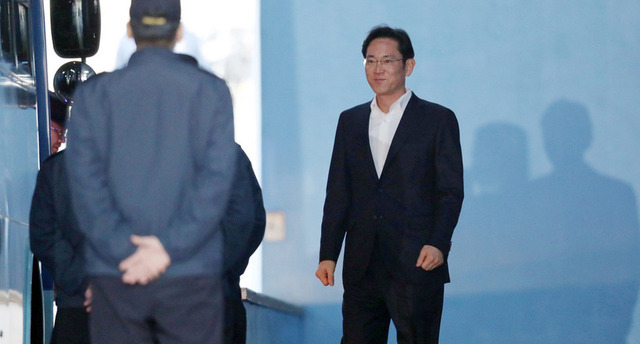Posted on : Feb.7,2018 19:07 KST
 |
|
Samsung Electronics Vice Chairman Lee Jae-yong smiles as he heads to a waiting car after being released from the Seoul Detention Center on Feb. 5. Lee was given a suspended prison sentence by an appeals court on charges of bribing former president Park Geun-hye. (Photo Pool)
|
The biggest logical flaw with the Feb. 5 verdict for Lee Jae-yong by the Seoul High Court 13th criminal division is that fact that the court let the Samsung Electronics vice chairman off the hook based on an arbitrary interpretation of the concept of “government-business collusion.” Government-business collusion is a situation where powerful political and business leaders align illicitly to provide each other with improper benefits. It’s a deep-seated vice within the chaebol economy system and a core element of corruption.
Yet the court’s verdict stated that the case showed no “evidence of typical government-business collusion, such as reckless business expansions based on secret transactions with government authorities, large illegal or illicit loans, and the provision of public funds using taxpayer money.” The examples listed by the court were all forms taken by government-business collusion during the past era of developmental dictatorship.
These days, with managing control being passed on from the founders to the second and third generations, the main focus of South Korean chaebols’ attention is on how to hand down the reins without paying taxes. Lee Jae-yong would have to pay billions of dollars in taxes to inherit managing control in the normal way. To avoid this, Samsung has resorted to illegal and questionably legal means such as the issuance of Samsung Everland convertible bonds (CBs) and Samsung SDS bonds with warrant (BWs) at giveaway prices.
The merger of Samsung C&T and Cheil Industries, which happened after chairman Lee Kun-hee was felled by illness in 2014, was the crowning moment in the succession of power to his son Lee Jae-yong. It made the younger Lee majority shareholder for Samsung C&T, which gained control over the group’s twin pillars in Samsung Electronics and Samsung Life.
What more could possibly be in it for him? The offering of bribes and the management succession were, to use the court’s language, “typical government-business collusion.” Yet the court claimed that Lee had “obtained no practical gain in exchange for the bribes.” In short, it’s a case of the judiciary deliberately adopting a highly restricted reading of government-business collusion statutes in order to free Lee – and rationalizing that collusion as a result.
It’s also difficult to fathom the court denying the very existence of a management succession effort. Former Minister of Health and Welfare Moon Hyung-pyo and others were convicted in their first and second trials on charges of pressuring the National Pension Service to approve the Samsung merger after receiving guidelines to that effect from former Blue House Senior Secretary to the President for Economic Affairs Ahn Jong-beom, who received his orders in turn from former President Park Geun-hye.
It has also emerged that the Blue House and the vice chairman of the Fair Trade Commission were involved in a large-scale reduction of share sales following the merger. Yet the court claimed that there was “no succession effort,” while refusing to accept Ahn’s notebooks or other materials and testimony as evidence.
The court did declare that it was “undeniable that there were some directly and indirectly beneficial effects for the acquisition of control of Samsung Electronics and Samsung Life.” It’s common sense that control of key affiliates is essential for the generational transfer of power. In coming up with a strained rationale to justify handing Lee a suspended sentence, however, the court presented an argument that simply doesn’t make sense.
Government-business collusion is the very root of the Park Geun-hye/Choi Soon-sil scandal. It’s for that reason that many South Koreans called for chaebol reform and an end to this collusion as tasks to “eradicate deep-rooted vices” during the candlelight demonstrations. But no amount of changes to the law or reforms to institutions will lead to chaebol reform as long as chaebol heads keep receiving slap-on-the-wrist punishments for their corrupt practices. That is why it is so important for the judiciary to enforce the law properly.
Please direct questions or comments to [english@hani.co.kr]









